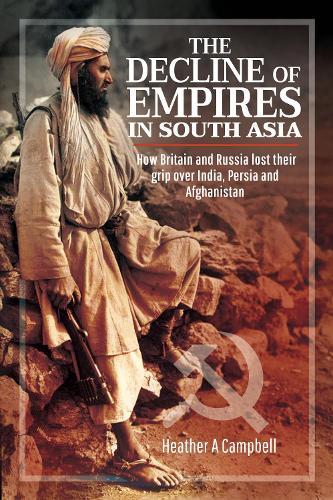Overview
The post-First World War period was pivotal in global history, international relations and geopolitics. And no more than in South Asia. where for decades the 'Great Game' in geopolitical rivalry of the two greatest modern empires - Britain and Russia - had dominated international relations. But with the advent of Communism in Russia and growing nationalism and pan-Islamism in Afghanistan, Persia and India, Britian's imperial standing was under threat. Faced with these problems, some in the British government, such as Lord Curzon, the dominant imperialist in the British Foreign Office, fell back on what they knew - old patterns of rivalry and high-handedness that characterised the Great Game. Not all, however, agreed with Curzon, and with war in Afghanistan, civil unrest in India, and rising tensions in Persia, those who opposed this Great Game mindset advocated a new way forward for British foreign relations. AUTHOR: Heather Campbell is an historian and political scientist specialising in British and Russian imperial history, the First World War, British policy in India, Afghanistan and Persia (later Iran), and Imperial and Soviet Russia. She has worked extensively on Lord Curzon, ex-Viceroy of India and British Foreign Secretary and principal promoter of the 'Great Game' mindset and policy in South Asia. After her BA in History at the University of Aberdeen, and Diploma in the Russian language at the University of Glasgow, she obtained her MA and completed her PhD on 'Bolshevism, Islamism and Nationalism: Britain's Problems in South Asia' at Queen Mary University of London. She has taught at the School of History at QMUL, lectured on the Third Anglo-Afghan War (1919) at the Royal United Services Institute (RUSI) and contributed an impressive article, 'Facing the Wasps' Nest: on the Third Afghan War of 1919 and Afghanistan's Independence in History Today. 8 b/w illustrations
Full Product Details
Author: Heather A Campbell
Publisher: Pen & Sword Books Ltd
Imprint: Pen & Sword Military
ISBN: 9781526775801
ISBN 10: 1526775808
Pages: 256
Publication Date: 01 April 2022
Audience:
General/trade
,
General
Format: Hardback
Publisher's Status: Active
Availability: Out of stock

The supplier is temporarily out of stock of this item. It will be ordered for you on backorder and shipped when it becomes available.
Reviews
""The Decline of Empires marries its exhaustive research with excellent writing and as such will appeal to a wide array of people from specialist scholars through to general readers. It contains instructive lessons on great power politics and strategy that have clear contemporary relevance.""-- ""Journal of Military History""
"""The Decline of Empires marries its exhaustive research with excellent writing and as such will appeal to a wide array of people from specialist scholars through to general readers. It contains instructive lessons on great power politics and strategy that have clear contemporary relevance.""-- ""Journal of Military History"""
Author Information
Heather Campbell is an historian and political scientist specialising in British and Russian imperial history, the First World War, British policy in India, Afghanistan and Persia (later Iran), and Imperial and Soviet Russia. She has worked extensively on Lord Curzon, ex-Viceroy of India and British Foreign Secretary and principal promoter of the 'Great Game' mindset and policy in South Asia. After her BA in History at the University of Aberdeen, and Diploma in the Russian language at the University of Glasgow, she obtained her MA and completed her PhD on 'Bolshevism, Islamism and Nationalism: Britain's Problems in South Asia' at Queen Mary University of London. She has taught at the School of History at QMUL, lectured on the Third Anglo-Afghan War (1919) at the Royal United Services Institute (RUSI) and contributed an impressive article, 'Facing the Wasps' Nest: on the Third Afghan War of 1919 and Afghanistan's Independence in History Today.




